| story by | |
| photos by | Steven Hertzog |
| OPEN A PDF OF THE ARTICLE |
KU Innovation Park biopharmaceutical companies foster advances in both human and animal sciences.
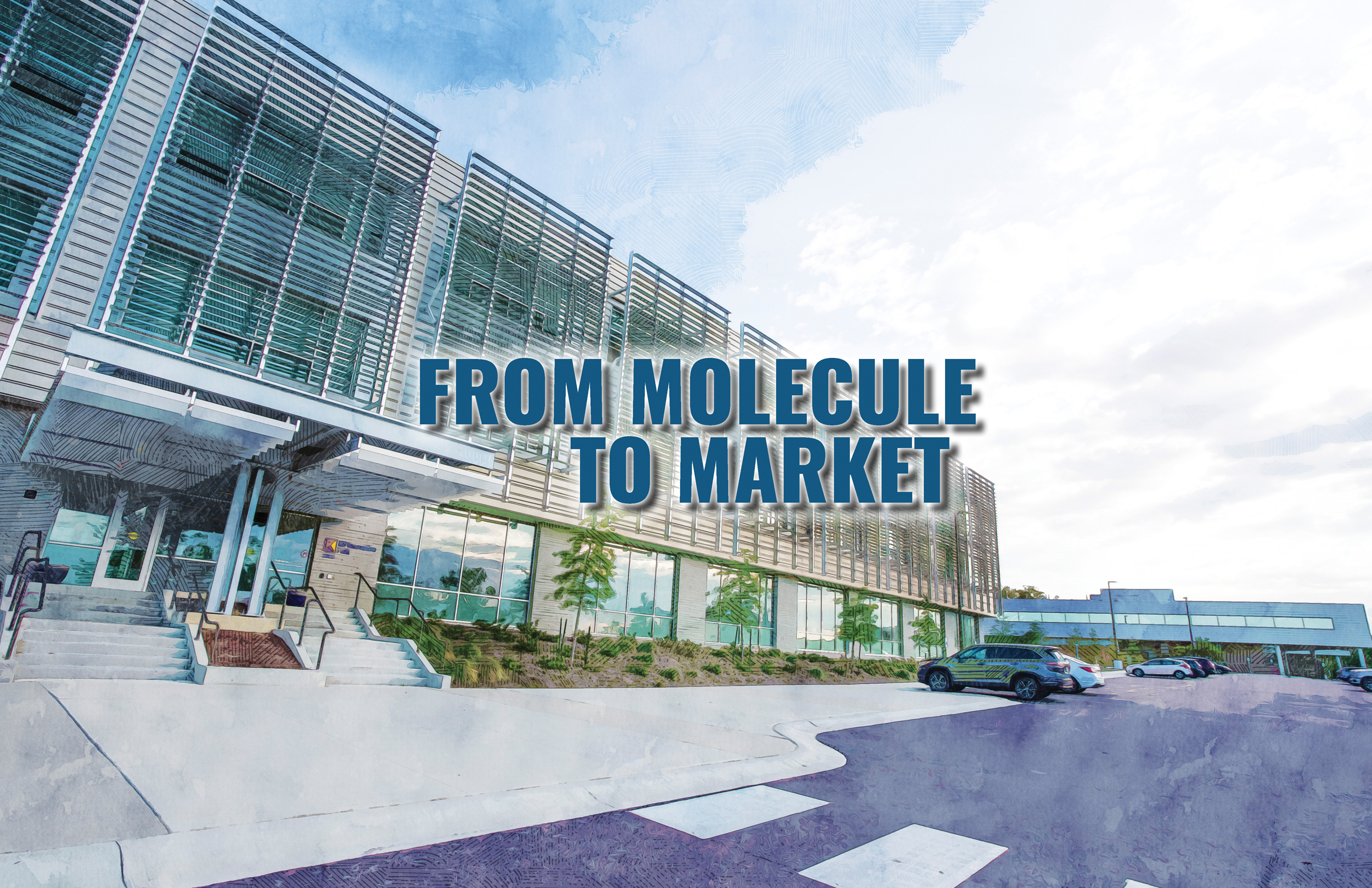
The Phase 3 building at KUIP
How does one dissolve a brick in a beaker of water? This is a question that James Pipkin, vice president of new product development at Ligand Pharmaceuticals and University of Kansas graduate, says describes the challenges he and his team face daily.
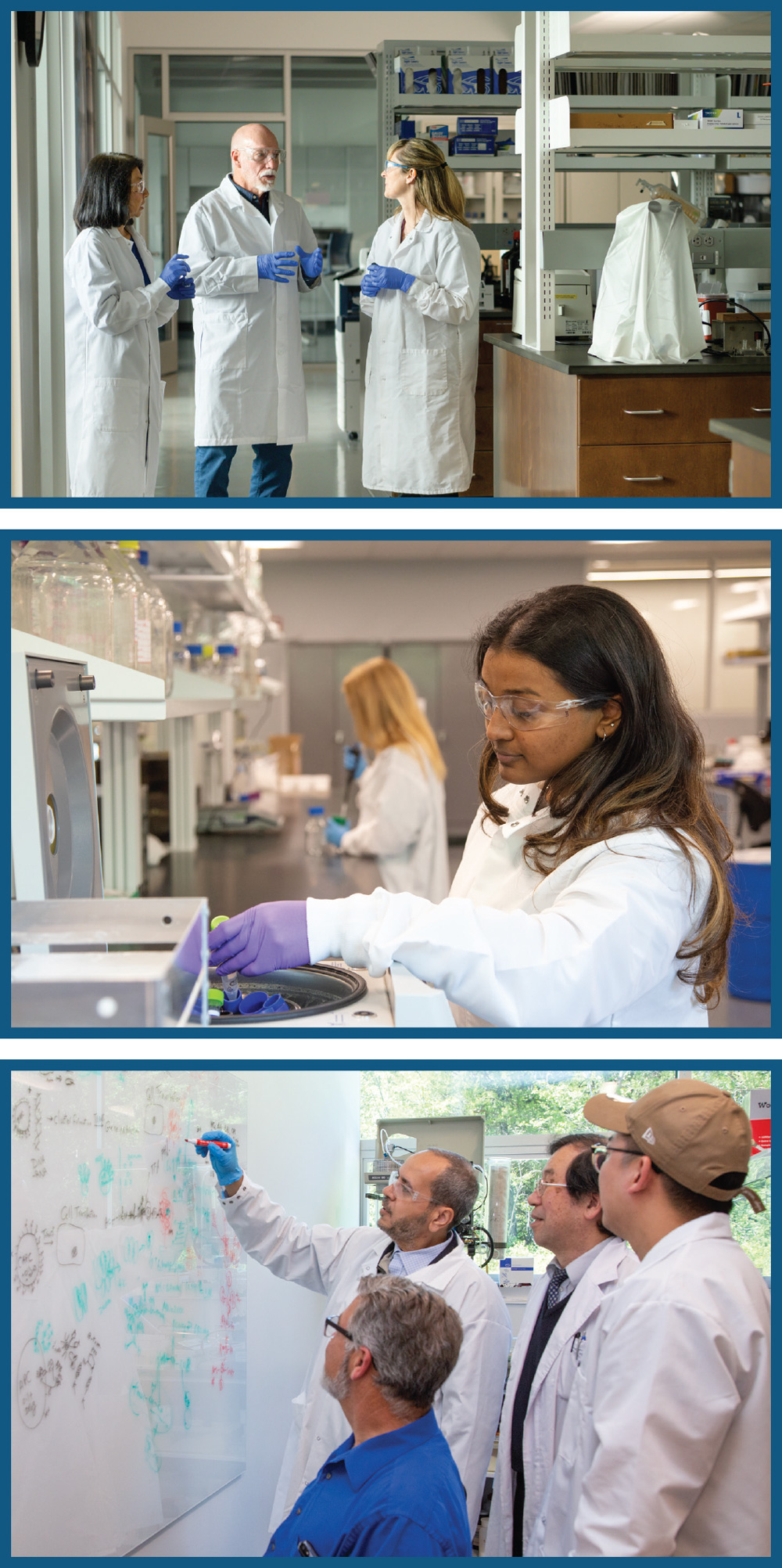
top to bottom: (L-R) Ligand’s Lian Rajewski, PhD, James Pipkin, PhD, Joanna Krise, B.Sc.Hons (photo by Jason Dailey)
Argenta’s Juanna Suraganan (foreground) and Ashley Stock (background) preparing samples for analytical testing
The team at Phoreus Biotech, Michael Coe, DVM PhD, Walid Maaty PhD, Takeo Iwamoto, PharmD, PhD, and Sungmin Yoon, PhD
Ligand is a biopharmaceutical company that out-licenses its Captisol drug-delivery platform to other companies, researchers and scientists to help them with their own product development. “People think a pharmaceutical product is just a simple thing; it’s not,” Pipkin explains. A large part of what the Captisol team does is help discover a way to get drugs into the body. Roughly half of all small-molecule drug candidates have low solubility. But for the body to accept a drug, it has to be in a solution. In basic terms, Captisol increases the solubility and stability of a drug so it can get into our bodies and become absorbed more efficiently.
Ligand owns the patent and technology of Captisol, a chemically modified cyclodextrin that was invented and initially developed at the University of Kansas (KU), and is the key ingredient that allows many drugs to be stable and soluble. Several of the products developed by the Captisol team at Ligand have ties to KU. Pipkin says he is honored to be a part of the KU legacy as well as a presence in its future.
“There are a lot of KU touches in the development line, especially from graduate students,” he says. “People don’t realize how great a reach and how international KU is in the pharmaceutical world.”
Ligand’s Captisol team and KU have been connected for more than 25 years. Pipkin says many of its clients come to the company through word of mouth and link back to the university. Thanks to many of the innovations first invented at KU, Ligand’s Captisol team is expanding the roots of delivery for many different drugs—the move from oral to injectables, oral, nasal, dermal or even ocular delivery.
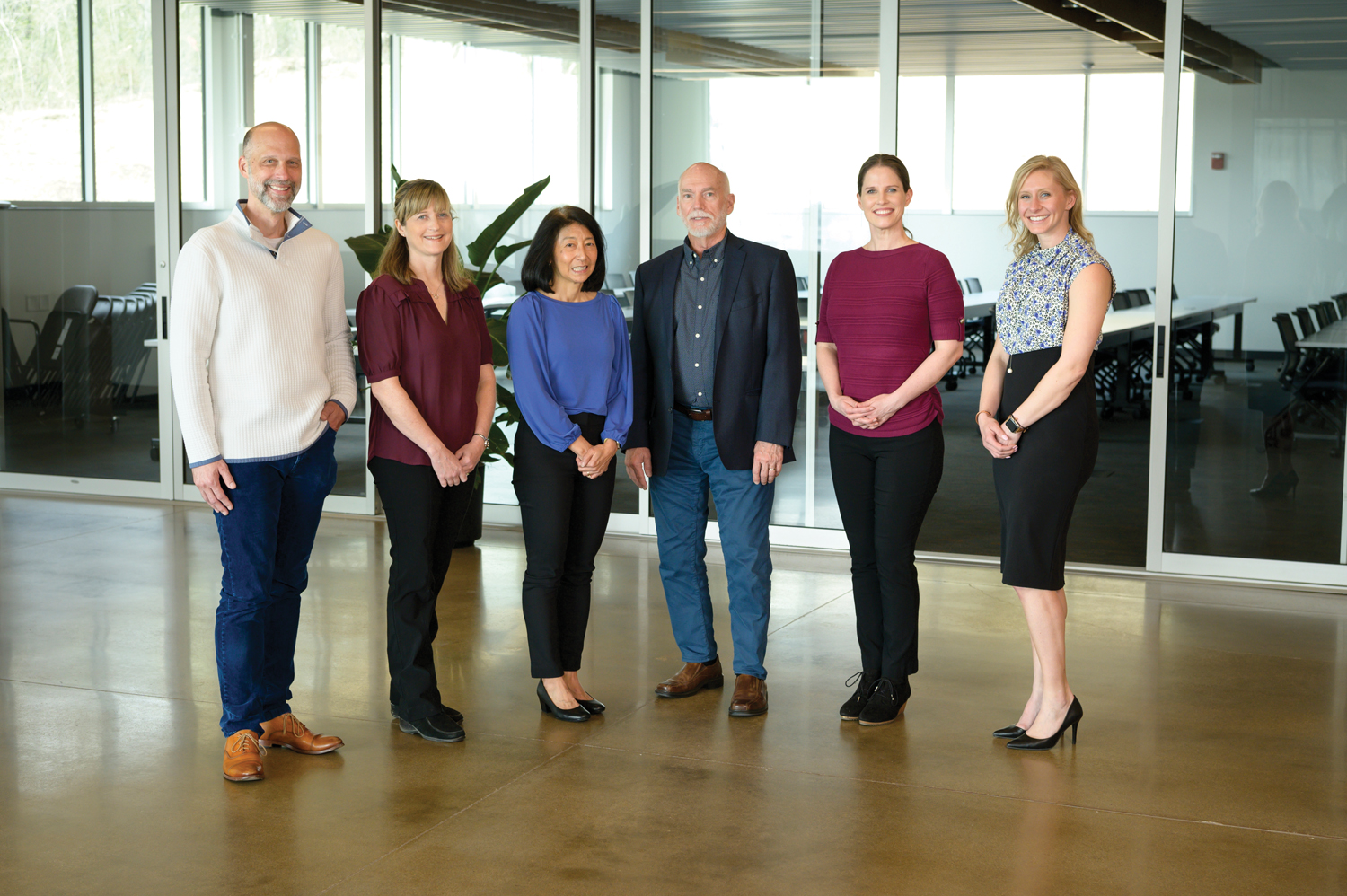
L to R: Ligand’s Vince Antle, PhD, Joanna Krise, B.Sc.Hons, Lian Rajewski, PhD, James Pipkin, PhD, Jessica Wolzen, Jessica Beach
Power of Pharmaceuticals
Vince Antle, senior vice president of technical operations and quality assurance at Ligand, is on a mission to show how Captisol can benefit companies outside of the pharmaceutical industry. One area Antle has his eye on is the food industry. He is currently pursuing the go-ahead for Captisol to be used in the development of new food products and supplements.
“Captisol would improve solubility of foods, mask taste and increase absorption,” he explains. One area this would be particularly beneficial in is vitamins, minerals and supplements. “The amount absorbed with these products is often low, but now we could take less and absorb more.”
Collaboration is key for the Captisol team at Ligand. It helps companies at all stages of the development cycle, even attending Food and Drug Administration (FDA) meetings with clients and helping them with approval to go to market.
LOCAL MATTERS
Our Local Advertisers – Making a Positive Impact
The team can also help with early stages of discovery. For example, about 10 years ago, a company called Gilead Sciences was developing a drug to treat Ebola that included Captisol, and it noticed the drug had positive responses with COVID. Because of this, Gilead asked Ligand to help by expanding Captisol production for its antiviral product. The COVID drug they developed was called Remdesivir and is now sold under the brand name Veklury. It is the only antiviral drug approved for COVID. Thanks to the team at Ligand, more than 13 million patients have received Veklury.
At KU Innovation Park, Ligand’s Captisol team is doing its share of innovating within the pharmaceutical world. Fosphenytoin, a prodrug also designed at KU and used to treat epilepsy, wasn’t initially room temperature stable. KU professor Val Stella, who created the drug, and his graduate students proved that the Captisol technology could make it room temperature stable. They scaled up manufacturing, ran clinical trials, secured a partner and further supported the eventual FDA approval of Sesquient, making the room temperature product a reality.
Melphalan is an agent used to treat cancer, but its stability limited its usefulness. Ligand’s Captisol team worked to create a more stable product and obtained an orphan designation (a status given to “orphan drugs” that show promise in the treatment, prevention or diagnosis of orphan, or rare, diseases) as a preconditioning agent prior to stem cell transplant to treat multiple myeloma. The team then worked with researchers at The University of Kansas Cancer Center to conduct the first clinical trials of this new formulation.
Pipkin says this is exciting stuff and something they have done for many clients looking to produce new drugs, and he looks forward to possible future projects.
Prevent the Poke
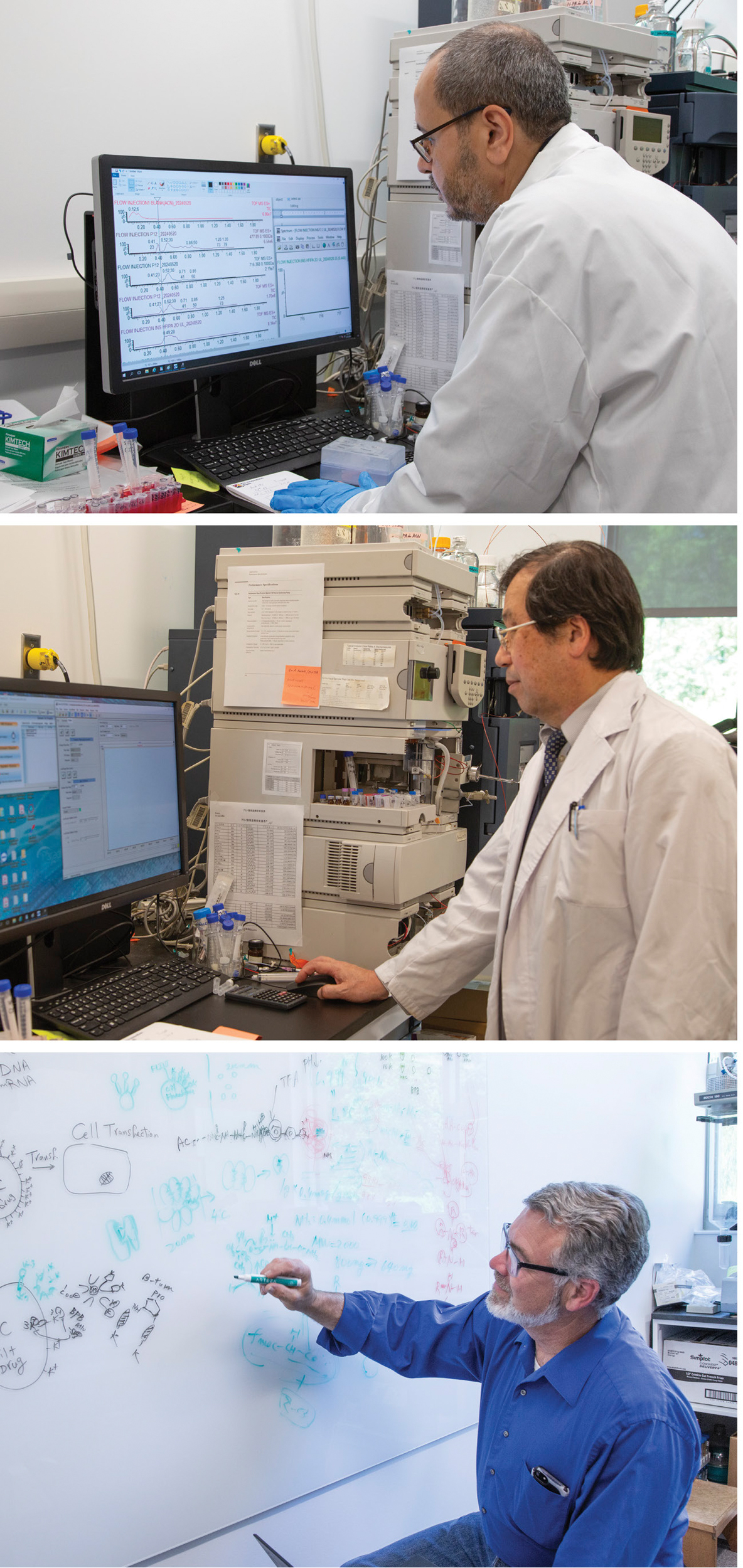
Phoreus Biotech(top to bottom): Walid Maaty, PhD Dynamic Light Scattering (DLS) to characterize the nanoparticles to ensure proper size and surface charge; Takeo Iwamoto, PharmD, PhD uses HPLC and mass spectrometry to evaluate nano-formulations ensuring encapsulation efficiency Michael Coe, DVM PhD, “white board” planning new oral formulations.
David Schaefer, CEO of Phoreus Biotech, is in the drug-delivery business. His pitch is simple: “Who likes getting injections? Well, we can deliver drugs without injections.” Along with Chief Scientific Officer (CSO) Michael Coe, Schaefer is developing drug delivery through routes that don’t involve injections, which often require expensive cold chain storage requirements, especially with vaccines. These refrigeration requirements are especially difficult for undeveloped countries.
For example, Phoreus develops technology so people can deliver insulin without a needle to those with diabetes. “Delivering insulin orally would help patients control and maintain their numbers better, and improve their life with diabetes, especially in nondeveloped countries that don’t have refrigerator services everywhere,” Schaefer explains.
The company focuses on bringing precision and equity to pharmaceuticals, equity being an pivotal word for Schaefer and his team. “Treatment for cystic fibrosis can be $300,000 a year. Without insurance, families can go broke,” Schaefer says. At Phoreus Biotech, Coe and his team are working with Drs. Matthias Salathe and Michael Kim at University of Kansas Medical Center to treat and cure cystic fibrosis.
Human lungs have a layer of mucus for protection. The problem with some methods of drug delivery is the drug can get stuck in the mucus layer before even reaching the cells, Schaefer explains. Doctors have been trying to find a way to get through the mucus layer for 25 years. Phoreus (while collaborating with the University of Kansas Medical School) has developed a way to get the inhaled drugs through the mucus layers of lungs and into cells, which would also be a less costly form of treatment.
Therapy for sickle cell anemia can also cost patients millions of dollars, as the treatment involves sucking out bone marrow, treating it genetically and replacing it, he adds. The process can also be incredibly painful. This illness especially affects underprivileged communities. Phoreus is working with a major pharmaceutical company to develop a treatment that only involves one injection.
The company is also collaborating with Lawrence biotech startup Oak Therapeutics to help people in West Africa with iron deficiencies and infectious diseases. Oak Therapeutics has developed a waferlike gel that sticks to the inside of the cheek to help solve issues associated with drug delivery. This type of delivery offers faster absorption and improved bioavailability. Currently, many West Africans are given iron pills that irritate their gut, forcing them to require an IV infusion instead. But IV infusion in this area is expensive, inconvenient and many times unavailable. Developing a solution that doesn’t involve pills or an IV, and is inexpensive is no small task.
Phoreus also develops technology that allows medicines to bypass the gut and delivery methods to keep the gut from breaking down the medicine so that it can more readily get into the bloodstream.
There is a major challenge, however, when it comes to these innovations: financing. “It’s a down cycle for investment,” CEO Schaefer explains. “Biotech has its own challenges. Our business is financed by private investors; we are trying to attract professional investment. Raising money is the issue.”
The number of biotech venture capitalists in the Kansas and Midwest area are few to none. He says there is a drought of capital—and lab space—in the area. Phoreus therefore knows the importance of being a part of KU Innovation Park.
CSO Coe agrees the lack of quality lab space is an issue. “The Phase III area at the park is already full. Funding and infrastructure are big issues. Being a part of the KU Innovation community gives us a special shine” and helps the company find funding dollars. Phoreus is constantly looking for investors to finance their new innovations. “Don’t buy a house, invest in Biotech,” Schaefer quips.
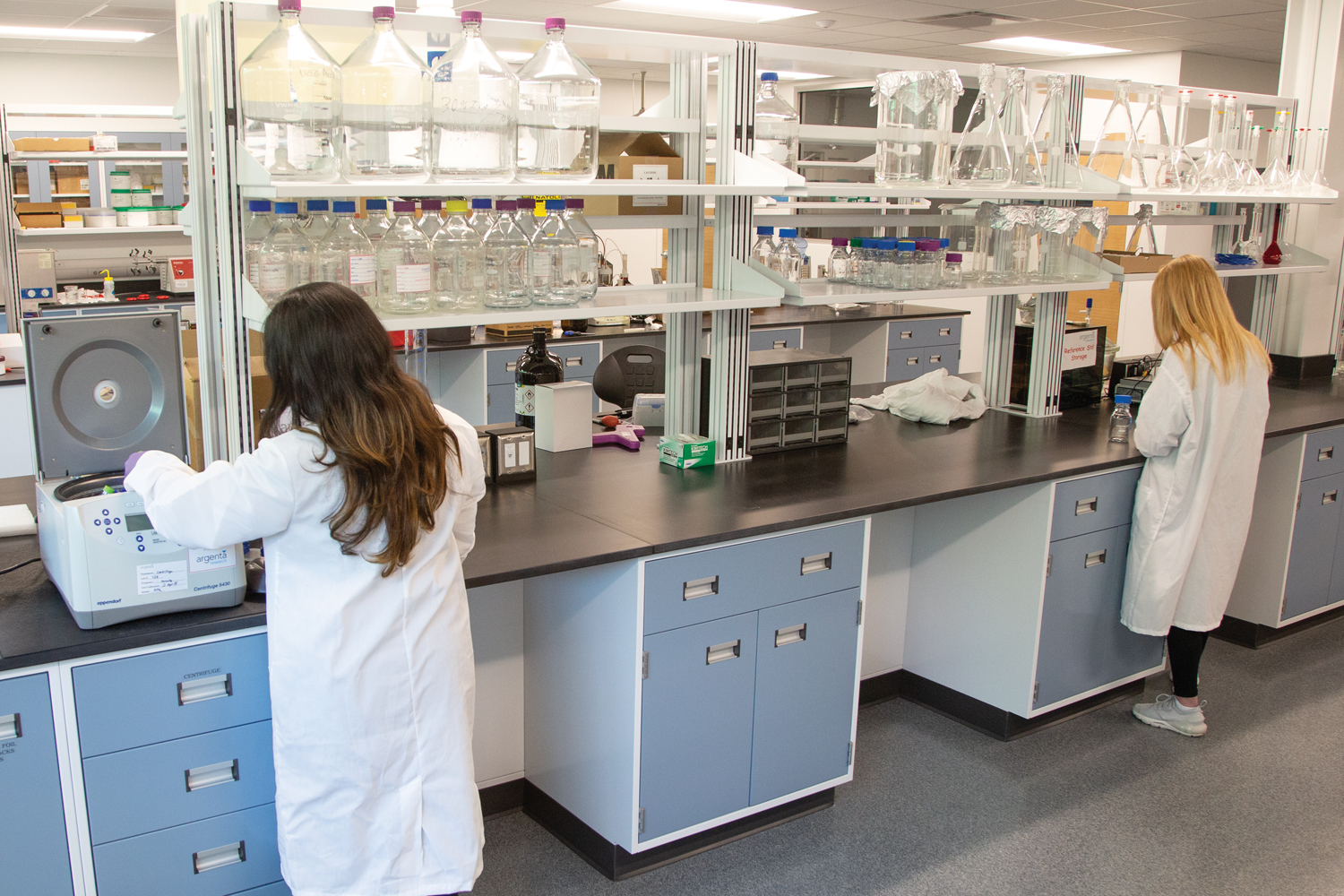
Argenta’s Juanna Suraganan and Ashley Stock preparing samples for analytical testing
No Animal Left Behind
If you are a lover of animals, don’t worry. Innovations are also being made in animal health science at KU Innovation Park. In fact, Argenta held a ribbon-cutting event in late May for its newly occupied research and development space in Phase III of the KUIP campus. This event was an opportunity for clients to engage with leadership from various business units representing the different facets of Argenta, which prides itself on being the world’s only global animal health contract research, development and manufacturing organization. The company assists other companies in every stage of product development, whether it be drug development, clinical services, manufacturing. Even if just a startup, Argenta wants to be the one to bring the idea into reality.
Argenta’s research and development group works with various animal health industry pharma companies (both large and small) to incorporate new types of novel molecules previously used in humans but now being adapted for use with companion or commercial animals. In short, animals will soon get some of the same stability, absorption and delivery methods of drugs offered to humans.
Argenta is no stranger to innovation. As part of the Kansas City Animal Health Corridor, an area anchored by Manhattan, Kansas, and Columbia, Missouri, and home to more than 300 animal health companies, representing the largest concentration in the world, the company works on a variety of drug dosage forms. For example, it helped develop sustained release injectables, delivering medication over several months with just one dosing. It has also worked on flavored tablets and soft chews, as well as capsules and topical treatments.
Like several other businesses at KUIP, Argenta is also in the business of keeping products stable and meeting their expected shelf life. Another part of the business is working with veterinary pharmaceutical companies to troubleshoot issues experienced with commercial products or to help find ways to refine testing processes. Argenta, like many of us, treats pets like another member of the human family.
KU Innovation Park is a haven for invention, innovation and intellect. Biotech companies are using its infrastructure to create, and thanks to its ties with KU, professors and even grad students, these companies are developing technology that makes our lives (and the lives of our best friends) a lot easier. From cancer to diabetes to cystic fibrosis to feline AIDS, new innovations are being created in these areas every day in Lawrence.
At 2029 Becker Dr., it already looks like 2029. They are finally figuring out how to get that brick into the beaker of water.




